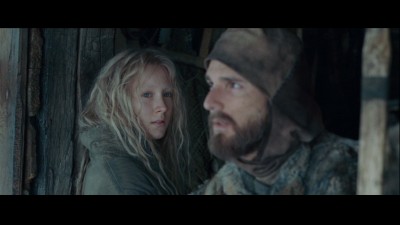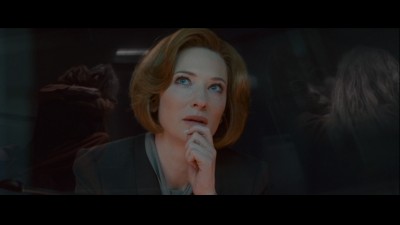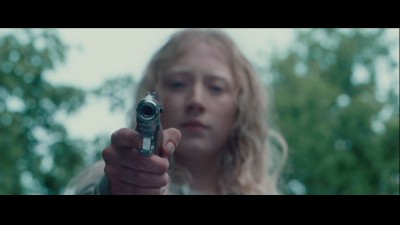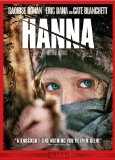| Reviews & Columns |
|
Reviews DVD TV on DVD Blu-ray 4K UHD International DVDs In Theaters Reviews by Studio Video Games Features Collector Series DVDs Easter Egg Database Interviews DVD Talk Radio Feature Articles Columns Anime Talk DVD Savant Horror DVDs The M.O.D. Squad Art House HD Talk Silent DVD
|
DVD Talk Forum |
|
|
| Resources |
|
DVD Price Search Customer Service #'s RCE Info Links |
|
Columns
|
|
|
Hanna

I try to avoid such blanket comparisons whenever I can, but this time it is just too apt, so the following is a claim made in all good faith and after careful consideration: Joe Wright's Hanna is, in almost every respect, this year's Run Lola Run. That is a compliment, but a qualified one, for what we have here is a simultaneously kinetic and controlled, music-driven, pure-action movie centering on an extraordinary, physically formidable young woman that, at the same time it does everything it can to floor us, epitomizing coolness and cleverness in the process, also defines the precise limitations of being clever and cool. It skirts right up against those boundaries, but its dedication to its own accomplished, clever formalism leaves it incapable of going any further.
The film, which was co-written by Seth Lochhead and David Farr, contains many fairytale references, both glancing and overt, and it plays much like a fairytale itself. When we first encounter Hanna (Saoirse Ronan) as she bow-hunts big game on a vast, wintry tundra somewhere, the sense is that she inhabits a timeless world. There is something elemental, survivalist about the opening sequences, in which Hanna and her father, Erik (Eric Bana, Munich) go through rigorous daily training rituals that involve fighting, hunting, cooking, alertness and fitness exercises, followed by evenings during which Erik passes the time in their eerie, storybook-like forest cabin by imparting the encyclopedic knowledge of the world to his daughter. We remain in some suspense for quite a long stretch at the beginning about whether or not these two characters have survived some sort of apocalypse and are now playing out their own, somewhat cozier version of The Road

As it turns out, we are in the present day after all, and Hanna's ethics-of-genetics thematic concerns have less in common with The Road than with Never Let Me Go. Erik is raising Hanna to the same end that any father raises his child: to survive in the world without his help. The difference is that Erik, who has kept her isolated in order to protect her from certain danger, knows that his little girl will have a much harder time of it than most. Hanna is the last remaining piece of evidence in a botched, controversial, aborted government research project, and when she finally, inevitably leaves home, she will be ruthlessly hunted by the CIA, in particular by one agent, Marissa (the excellent Cate Blanchett, enjoying the hell out of playing a coldblooded villain) who has a particularly vested interest in sweeping Hanna under the rug. (The question of just how human Hanna is, and to what extent she is only the remorseless, quasi-Nietzschean ideal soldier she was "designed" to be, remains unpredictably open throughout.)
The film thus becomes an unusual combination of thrilling chase adventure and coming-of-age story as Hanna experiences the world of other human beings for the first time. She falls in with a muddled but lovable family on a camping trip, whose progressive-parenting mother is played to good comic effect by Rushmore's Olivia Williams, and whose teenaged daughter, about Hanna's age, introduces Hanna to the rebellious, defiantly incoherent, precociously sexualized thrills of adolescence. Hanna's goal, as she travels along with her new friends, is to make her way to Berlin, where she is meant to reunite with Erik; but even as she enjoys the new sights and sounds of a world she knew about but has never taken in firsthand until now, she is also the subject of a deadly search, forced to outrun, outfight, and otherwise evade or escape capture by some extremely dangerous international deadly-mercenary-spy types recruited by Marissa. When she finally arrives in Berlin and this international game of cat-and-mouse reaches its culmination, what she has discovered about who she is, who Erik is, what Marissa represents, and where she actually came from will result in a journey's end that reconnects, in a pleasing and elegant narrative echo, to its beginning.

On a certain level, Hanna is ravishing, and it has a creative urgency to it that cannot be denied. I was not all that taken with Wright's 2007 film adaptation of Ian McEwan's Atonement, but what cinephile saw that and was not bowled over by its thrillingly long, uncut, beautifully executed five-minute tracking shot of James McAvoy's soldier as he traverses the battlefield at Dunkirk? Wright finds a way to do a similarly impressive one-take shot with Bana here, and he never stops deploying myriad other selections from his seemingly bottomless arsenal of momentum-producing cinematic technique. Technique is part of what sweeps us up in Hanna, but it is also probably the primary stumbling block that keeps it from being a great or even a very memorable film. The brittle, clattering Chemical Brothers score works well enough as background, but too many scenes have been too closely choreographed to it in the editing room, creating a music-video quality that makes these sequences feel at once too busy and not actually necessary, even when they are. The fancy, extraneous propulsion can overwhelm and distract from the film we thought we were watching, and at times Wright's and editor Paul Tothill's tendency to overly syncopated cutting, coupled with the geometrical dead-centeredness of most shots, steers things dangerously close to feeling like a video game (despite the film's subtle, very well-integrated use of CGI effects). It is not that every heart-pounding moment of Hanna is not riveting, but that these moments tend not to leave much in their wake. Wright is almost too tensely dedicated to being graphically pleasing at every moment (not to mention narratively, visually, and sonically very symmetrical, always) which makes for a cinematic ride that, while never less than arresting and inventive, feels just a tad empty and unsatisfying. Hanna is a film well worth seeing, bursting as it is with enough energy and dynamism to easily bring it across; but for all that liveliness, it seems in the end somehow short on life.

THE DVD:
Hanna may indulge in some off-putting visual slickness at times, but an almost obsessive amount of thought on Wright and cinematographer Alwin H. Kuchler's part has gone into giving it its remarkable, often very spacious, meticulously color- and light-conscious look, and that look is flawlessly retained to the fullest extent possible on this DVD edition. I did not notice a single instance, at any point in this excellent anamorphic, 2.35:1 aspect-ratio transfer, of any sort of compression artifacting or missteps in the mastering process.
Sound:Hanna is the kind of action film that exists in part to make full use of the big-sound possibilities of Dolby surround, and it does not disappoint; all the music, gunshots, sound effects, and dialogue are bold and full, making the sound design its own quite noticeable character. (Sometimes that's good for the film; occasionally, it's detrimental.) The Dolby Digital 5.1 surround soundtrack on the DVD is crystal-clear and distortion-free, leaving every thread in Hanna's luxuriant sonic tapestry free to sparkle to its utmost capacity.
Extras:The two extras with Wright--an approximately 10-minute "Anatomy of A Scene" in which he breaks down a complicated action shot for us, as well as his relaxed, enjoyable if somewhat insubstantial feature-length commentary--show him to be an affable, generous-spirited postmodernist, politely hemming and hawing his charmingly English way through recollections of how certain shots had to be thought up on the spot and referencing, as influences on the film, everything from YouTube to Persona to (you guessed it) "mid-90s music videos."
An alternate ending from the film is actually a rare instance where the call would seem to have been very tough. The unused ending, which was meant to follow the final scene of the film as it exists, is succinct and sharp enough, and one assumes it was only cut because it would have detracted a bit from the even sharper, more succinct ending we get in the final cut.
FINAL THOUGHTS:Its considerable achievements easily make up for what it lacks, but Hanna is a film more amazing than it is meaningful. It is, however, more intelligent, interesting, and sophisticated in every way than any typical action film you can think of. Even if it does sometimes feel like an overly strenuous, programmed-to-impress exercise in style over substance, Wright's style as manifest here is something nobody who loves the movies will want to miss out on. It may not be enough to make Hanna into anything like a great film, but it is applied with enough care, and with enough attention otherwise paid to maintaining the integrity of the film as a whole, to make it a good one. Recommended.
|
| Popular Reviews |
| Sponsored Links |
|
|
| Sponsored Links |
|
|
| Release List | Reviews | Shop | Newsletter | Forum | DVD Giveaways | Blu-Ray | Advertise |
|
Copyright 2024 DVDTalk.com All Rights Reserved. Legal Info, Privacy Policy, Terms of Use,
Manage Preferences,
Your Privacy Choices | |||||||













